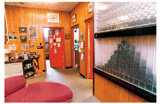The major purposes of the ICRL research agenda are the ongoing acquisition of new fundamental knowledge about consciousness-correlated physical phenomena, and the encouragement and support of such efforts by its members. Consistent with its PEAR heritage, most ICRL projects comprise investigations in the areas of anomalous human/machine interactions, remote perception, and theoretical modeling; others range farther afield. These are embellished by an assortment of investigations into other potentially relevant consciousness-related anomalies.
Human/Machine Anomalies
A new generation of micro-electronic random event generators (REGs) produced by Psyleron, Inc. are compatible with most contemporary computer hardware and software. These are equipped with all of the basic experimental software and data analysis capabilities necessary to carry out the kinds of experiments originally performed at PEAR, but permit such explorations to go beyond the technical constraints that limited the scope of earlier work. Also, whereas the PEAR research was largely confined to investigation of physical aspects of human/machine phenomena, ICRL studies are now free to focus on the more subjective variables associated with these processes.

REG-based studies fall into two main categories: those that address the effects of human intention on the performance of these devices in controlled laboratory settings; and those that explore their responses to resonant group environments, or what we have termed “FieldREG.” Some of the former study the correlation of results with different subjective states of operator consciousness, or with various operational strategies; others investigate the effects of environmental factors.
FieldREG experiments examine the output of REGs exposed to various group activities and rituals; to therapeutic clinical situations; to classroom techniques; to alternative healing modalities; or to biological processes. Still others have been incorporated into art installations, or deployed during theatrical performances or athletic events.
Remote Perception
A current ICRL project is extending the PEAR studies of remote perception phenomena to explore linguistic, cultural, and environmental factors. Results from established and new databases are being evaluated using alternative analytical strategies, and the effectiveness of these various quantitative methods are being compared with subjective assessments from raw free-response data. This work is supplemented by a few exploratory pilot experiments employing substantially different protocols.
Theoretical Models
The stark inconsistencies of the effects observed in anomalies research with established physical and psychological presumptions places extraordinary demands on the development of competent new theoretical models for constructive dialogue with the empirical data. A number of conceptual frameworks that have been useful in this regard are included on the Publications page of the PEAR website. The most recent of these is an overarching exhortation to “Change the Rules!,” which postulates that the scientific enterprise must substantially broaden its methodology and conceptual vocabulary to embrace subjective experience and meaning as pertinent parameters.
Consistent with this injunction, several ICRL projects are actively pursuing development of such a Science of the Subjective. These include compilation of a comprehensive historical/philosophical overview of the progression of scientific representation of the role of consciousness; an inquiry on how anomalous mental processes might have contributed to a neo-Lamarckian mechanism of biological evolution; and an investigation of how the concept of syntropy might act to balance the traditional entropic decay in physical dynamics.
Related Projects
ICRL also maintains substantial interests in research into biophoton physics and alternative healing modalities, as well as into the broad category of “Earth Mysteries,” or more specifically, cognitive archaeology. Of particular emphasis here is the field of study now known as “archaeoacoustics,” derived from a 1994 ICRL study investigating the acoustical properties of ancient ceremonial sites in the U.K. In addition to publications in two refereed journals, this survey was featured in a special BBC documentary called “Secrets of the Dead” and in a companion book by Paul Devereux titled Stone Age Soundtracks. A related study, published in the journal Time and Mind, describes a laboratory examination of the effects of the specific resonant frequencies observed at these sacred sites on regional brain activity. Similar explorations are being carried out in collaboration with The Dragon Project Trust.
Broader attention to Earth Mysteries includes the study of anomalous earth lights, where ICRL-sponsored explorations have been conducted in Marfa, Texas; in rural New York and New Jersey; and in the Eastern Kimberley/Cambridge Gulf area of Australia . We also maintain ongoing collaborations with Project Hessdalen in Norway and the International Earthlight Alliance.
Support
All of ICRL’s activities are financed by philanthropic contributions from visionary individuals and organizations. We would welcome your tax-deductible donation in support of our overall educational objective, or of any of the specific enterprises described above. If you would like to contribute, please visit our contributions page.

